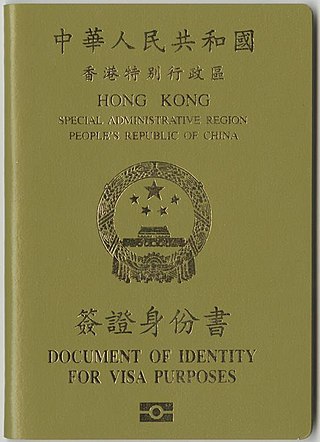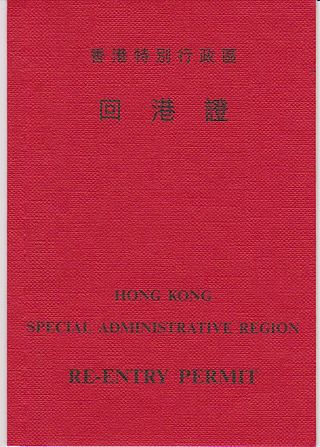
The special administrative regions (SAR) of the People's Republic of China are one of four types of province-level divisions of the People's Republic of China directly under the control of its Central People's Government, being integral areas of the country. As a region, they possess the highest degree of autonomy from China's central government. However, despite the relative autonomy that the Central People's Government offers the special administrative regions, the National People's Congress and its Standing Committee remains capable of enforcing laws for the special administrative regions.
The right of abode is an individual's freedom from immigration control in a particular country. A person who has the right of abode in a country does not need permission from the government to enter the country and can live and work there without restriction, and is immune from removal and deportation.

The Hong Kong Special Administrative Region passport is a passport issued only to permanent residents of Hong Kong who also hold Chinese citizenship. In accordance with the Basic Law of the Hong Kong Special Administrative Region, since the handover in 1997, the passport has been issued by the Immigration Department of the Government of Hong Kong under the authorisation of the Central People's Government of the People's Republic of China. As the official languages of Hong Kong are Chinese and English, the passport is printed bilingually in both Chinese and English. In addition, unlike Chinese passport which can be issued by Chinese diplomatic missions abroad, the Immigration Department of Hong Kong is the only issuing authority for HKSAR passports.

The Hong Kong Special Administrative Region Document of Identity for Visa Purposes is a biometric travel document issued by the Hong Kong Immigration Department to residents of Hong Kong who are unable to obtain a national passport. It is usually valid for seven years.

Hong Kong Re-entry Permit are issued to Hong Kong residents by the Hong Kong Special Administrative Region (HKSAR) for travel to mainland China and Macau Special Administrative Region.

Chinese nationality law details the conditions by which a person holds nationality of the People's Republic of China (PRC). The primary law governing these requirements is the Nationality Law of the People's Republic of China, which came into force on September 10, 1980.

The Macao Special Administrative Region of the People's Republic of Chinapassport is a passport issued to Chinese citizens who are permanent residents of the Chinese Special Administrative Region of Macau.

A travel document is an identity document issued by a government or international entity pursuant to international agreements to enable individuals to clear border control measures. Travel documents usually assure other governments that the bearer may return to the issuing country, and are often issued in booklet form to allow other governments to place visas as well as entry and exit stamps into them.

The Exit & Entry Permit for Taiwan, Republic of China is the document for the bearer to enter into and/or depart from the Taiwan Area, namely Taiwan, Penghu, Kinmen and Matsu. Currently, there are several types of Exit & Entry Permit that reflect the bearer's residency status. The permit is issued by the National Immigration Agency of the Republic of China (Taiwan). For different purposes, the permit is also known as:

The People's Republic of China passport is a passport issued to citizens of the People's Republic of China for the purpose of international travel, and entitles its bearer to the protection of China's consular officials overseas.

Taiwanese nationality law details the conditions in which a person is a national of the Republic of China, commonly known as Taiwan. The Nationality Act is based on the principle of jus sanguinis, children born to at least one Taiwanese parent are automatically nationals at birth. Foreign nationals with residency in Taiwan may naturalize after continuously living in the country for at least five (5) years. Certain foreign immediate family members of Taiwanese nationals may naturalize after continuously living in the country for at least three (3) years.

Visitors to the Republic of China (Taiwan) must obtain a visa or authorization in advance, unless they come from one of the visa exempt countries or countries whose nationals are eligible for visa on arrival. All visitors must hold a passport valid for 6 months.

The Mainland Travel Permit for Taiwan Residents, also known as the Taiwan Compatriot Permit, is a type of travel document issued by the Government of the People's Republic of China (PRC) to Republic of China nationals (ROC) who hold household registration in Taiwan. The document is issued by the Ministry of Public Security (MPS). Since the identity documents issued by the government of the Republic of China are not recognized in the PRC, the permit serves as both the main travel document and identity document for Taiwanese people in the PRC territory and is used on all occasions in lieu of a Taiwan passport.

The Government of the Macau Special Administrative Region allows citizens of specific countries/territories to travel to Macau for tourism or business purposes for periods ranging from 14 to 180 days without having to obtain a visa. For other entry purposes, such as establishing residence on a long-term basis, a different policy applies.

The visa policy of mainland China deals with the requirements which a foreign national wishing to enter the mainland of the People's Republic of China must meet to obtain a visa from one of the Chinese diplomatic missions, which is a permit to travel to, enter, and remain in the country. Visa exemptions are based on bilateral agreements and unilateral decisions. The residents of Hong Kong, Macao, and Taiwan with Chinese nationality may stay in Mainland indefinitely as long as their travel documents are valid.

The visa policy of Hong Kong deals with the requirements in which a foreign national wishing to enter Hong Kong through one of the 15 immigration control points must meet to obtain an entry permit or Visa, which depending on the traveller's nationality, may be required to travel to, enter, and remain in the Hong Kong Special Administrative Region. Visitors from over 145 countries are permitted without Visa entry for periods ranging from 7 to 180 days, to the Hong Kong Special Administrative Region for tourism or certain business-related activities. All visitors must hold a passport valid for more than 1 month.

The Macao Special Administrative Region Travel Permit is a biometric international travel document issued to non-permanent residents of Macao SAR holding Chinese nationality, who also possess a Macao SAR Non-Permanent Resident Identity Card, and are not eligible for any other type of travel document. Permanent residents of Macao of non-Chinese nationality are also eligible.

The British National (Overseas) passport, commonly referred to as the BN(O) passport, is a British passport for people with British National (Overseas) status. BN(O) status was created in 1987 after the enactment of Hong Kong Act 1985, whose holders are permanent residents of Hong Kong who were British Overseas Territories citizens until 30 June 1997 and had registered as BN(O)s.
The gallery of passport stamps by country or territory contains an accurate alphabetical list of sovereign states, partially recognised states, and dependent territories with images of their passport stamps including visas. All Schengen countries and Cyprus use the same format for their stamps and stamps are not issued when traveling from one Schengen country to another, except for land border crossings to, from, and between Romania and Bulgaria.

All visitors to Djibouti must obtain either a visa on arrival to Djibouti, an electronic visa online or a visa from one of the Djiboutian diplomatic missions prior to arrival in Djibouti, unless they come from one of the visa exempt countries mentioned below.

















